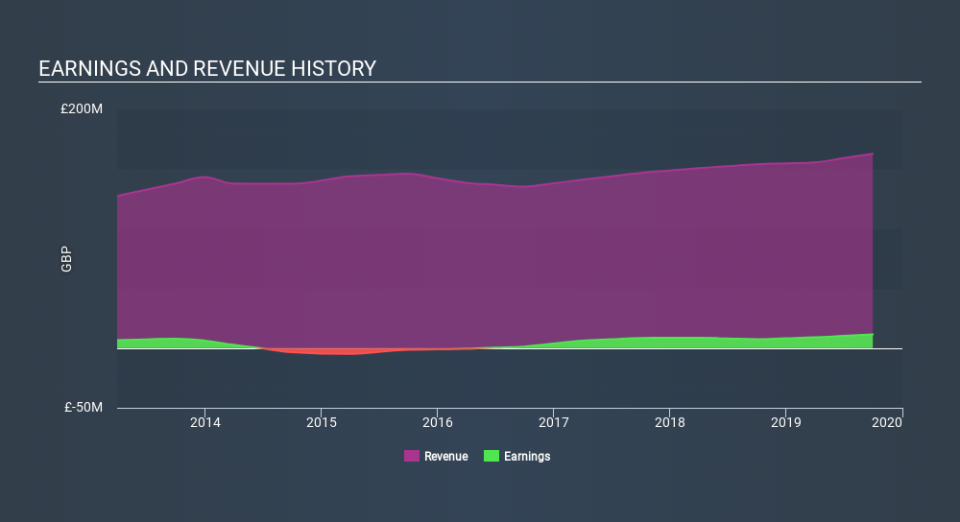With EPS Growth And More, Charles Stanley Group (LON:CAY) Is Interesting

Some have more dollars than sense, they say, so even companies that have no revenue, no profit, and a record of falling short, can easily find investors. Unfortunately, high risk investments often have little probability of ever paying off, and many investors pay a price to learn their lesson.
So if you're like me, you might be more interested in profitable, growing companies, like Charles Stanley Group (LON:CAY). While profit is not necessarily a social good, it's easy to admire a business that can consistently produce it. While a well funded company may sustain losses for years, unless its owners have an endless appetite for subsidizing the customer, it will need to generate a profit eventually, or else breathe its last breath.
View our latest analysis for Charles Stanley Group
Charles Stanley Group's Improving Profits
Over the last three years, Charles Stanley Group has grown earnings per share (EPS) like young bamboo after rain; fast, and from a low base. So I don't think the percent growth rate is particularly meaningful. As a result, I'll zoom in on growth over the last year, instead. Like a wedge-tailed eagle on the wind, Charles Stanley Group's EPS soared from UK£0.15 to UK£0.23, in just one year. That's a commendable gain of 55%.
I like to see top-line growth as an indication that growth is sustainable, and I look for a high earnings before interest and taxation (EBIT) margin to point to a competitive moat (though some companies with low margins also have moats). I note that Charles Stanley Group's revenue from operations was lower than its revenue in the last twelve months, so that could distort my analysis of its margins. Charles Stanley Group maintained stable EBIT margins over the last year, all while growing revenue 5.7% to UK£163m. That's a real positive.
The chart below shows how the company's bottom and top lines have progressed over time. To see the actual numbers, click on the chart.
Of course the knack is to find stocks that have their best days in the future, not in the past. You could base your opinion on past performance, of course, but you may also want to check this interactive graph of professional analyst EPS forecasts for Charles Stanley Group.
Are Charles Stanley Group Insiders Aligned With All Shareholders?
I like company leaders to have some skin in the game, so to speak, because it increases alignment of incentives between the people running the business, and its true owners. As a result, I'm encouraged by the fact that insiders own Charles Stanley Group shares worth a considerable sum. Given insiders own a small fortune of shares, currently valued at UK£51m, they have plenty of motivation to push the business to succeed. At 31% of the company, the co-investment by insiders gives me confidence that management will make long-term focussed decisions.
Should You Add Charles Stanley Group To Your Watchlist?
Given my belief that share price follows earnings per share you can easily imagine how I feel about Charles Stanley Group's strong EPS growth. Further, the high level of insider ownership impresses me, and suggests that I'm not the only one who appreciates the EPS growth. So this is very likely the kind of business that I like to spend time researching, with a view to discerning its true value. If you think Charles Stanley Group might suit your style as an investor, you could go straight to its annual report, or you could first check our discounted cash flow (DCF) valuation for the company.
Of course, you can do well (sometimes) buying stocks that are not growing earnings and do not have insiders buying shares. But as a growth investor I always like to check out companies that do have those features. You can access a free list of them here.
Please note the insider transactions discussed in this article refer to reportable transactions in the relevant jurisdiction
If you spot an error that warrants correction, please contact the editor at editorial-team@simplywallst.com. This article by Simply Wall St is general in nature. It does not constitute a recommendation to buy or sell any stock, and does not take account of your objectives, or your financial situation. Simply Wall St has no position in the stocks mentioned.
We aim to bring you long-term focused research analysis driven by fundamental data. Note that our analysis may not factor in the latest price-sensitive company announcements or qualitative material. Thank you for reading.

 Yahoo Finance
Yahoo Finance 
